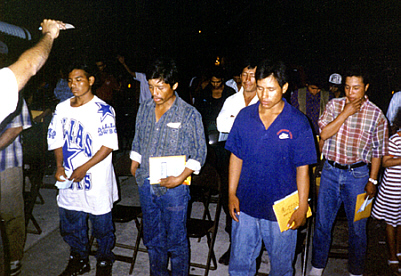General Board of Global Ministries
![]()
UM Information
UM
Reporter
![]()
Florida Southern College
![]()
Bethune
Cookman College
![]()
FL UM Children's Home
![]()
|
|
Lay speaker serves as minister to Hispanics |
|
Residents of a housing project in Palmetto worship at one of Parrish United Methodist Church's "exportable worship services" led by Reyes Martinez, the church's director of Hispanic ministries and a local church lay speaker. Martinez and a praise band "export" worship from the church to the population centers to reach as many people as possible. |
| Lay speaker serves as minister to Hispanics By Michael Wacht PARRISH — Reyes Martinez preaches five nights a week, leading three worship services at Parrish United Methodist Church here, one at a local migrant camp and one in a housing project in Palmetto City. Martinez is not a pastor. He is a local church lay speaker and director of Hispanic ministries at the Parrish church. In that role he leads a congregation with an average weekly attendance of more than 125 people and has a ministry that is touching the lives of many more than that, according to the Rev. Bill Payne, pastor of the church. He does it all while holding down a full-time job outside the church. Payne believes the success his church has had in reaching out to a new group of people is due, in large part, to the Lay Speaking Ministry. "We are reaching people most [United] Methodist churches are not able to reach," Payne said. "We’re not reaching down in a paternalistic way, but reaching right out, peer to peer, with people who know the culture." He also believes what’s happening in his church can be duplicated throughout the conference. "It’s [Lay Speaking Ministry] a means for the Florida Conference to reach out and do ministry with people like we’ve never done before," Payne said. The church’s Hispanic ministry began a week after Payne was appointed to the church in 1998. "Reyes came in…and asked if I was interested in having a Hispanic ministry," he said. After praying about it and learning that the community is at least 25 percent Hispanic, Payne said yes to Martinez’s proposal. "He has organized a grass-roots ministry," Payne said. "He has a gift for preaching. I let brother Reyes be the pastor, and I’m like a supervising elder for him." Martinez received his local church lay speaker certification in August when the Florida Conference held its first Spanish-language training program. In December, he is going to Alabama for his advanced training. One of Martinez’s challenges is transportation, so he is decentralizing his ministry and "going where the people are," Payne said. Martinez has developed "exportable services" in which he and a praise band travel to the migrant camp and housing project to preach and minister there. "He has 55 kids in Sunday school each week, because that’s all we can pick up with our van in three trips," Payne said. Payne, who is working on a doctorate in early American Methodism, said the ministry of lay speakers like Martinez is closer to the original Methodist model for ministry than today’s professional model. "The problem with the professional model is it says a pastor has to go to seminary," Payne said. "A good story and a heart for ministry is all that was needed in the early church. The circuit riders educated themselves as they did ministry." He said the professional model also acts as a barrier for many immigrant people who are called to ministry. "When you lay the need for a master’s of divinity degree on them [immigrants], it makes the ministry unreachable for them. That’s why we don’t have many indigenous pastors. If Reyes had to get a B.A. and M.Div., he’d be 10 years out, and I won’t have any of this." Payne said the Lay Speaking Ministry has allowed the Parrish church and Martinez to each accomplish something they would not have otherwise been able to. "Mr. Martinez could never have started this ministry on his own. Unfortunately, the Hispanic people in this area are poor and can’t support a full-time pastor," he said. "I speak Spanish, but I’m not indigenous to them and their culture." Top
of this page |

